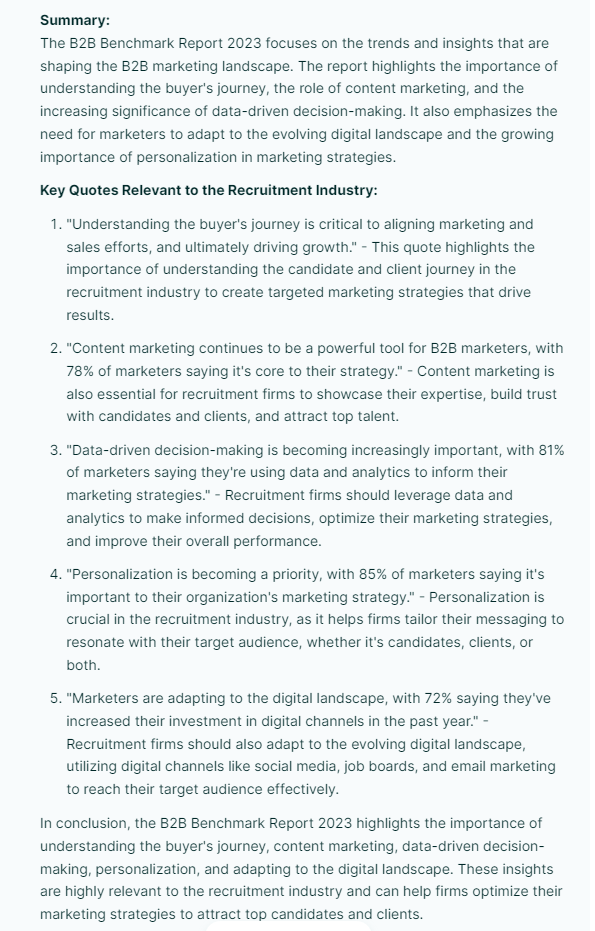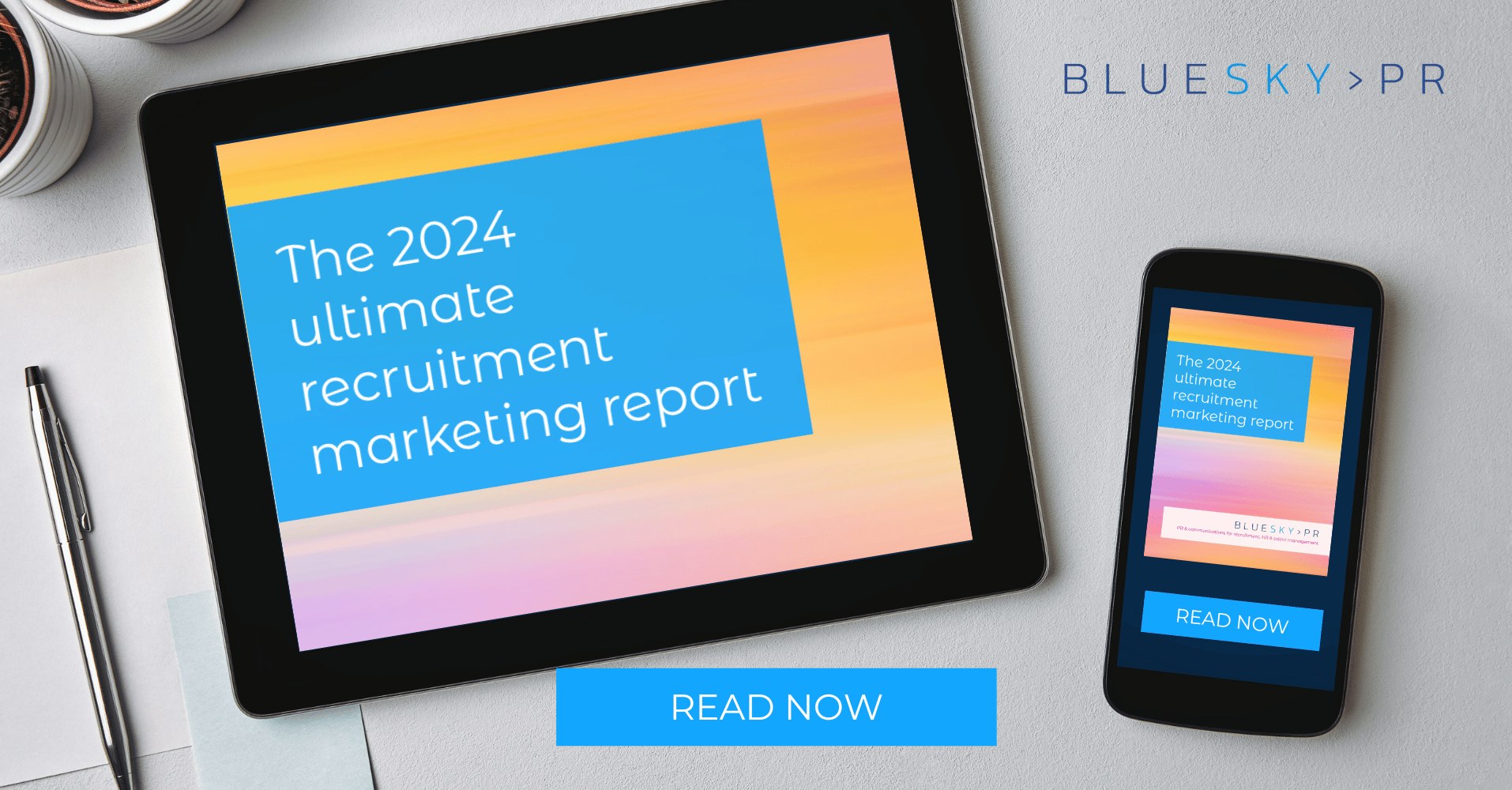I asked: Can you summarise this report and pull out the key quotes relevant to the recruitment industry? https://business.linkedin.com/content/dam/me/business/en-us/amp/marketing-solutions/images/lms-state-of-b2b-marketing/pdf/the-b2b-benchmark-report-2023-final.pdf
It answered:

Great I thought. And turned it into a blog post (see below).
Only it wasn’t great. See I had scanned through the report, which is why I knew it was relevant and I wanted to put together a blog post based on some of the insights. BUT the quotes and figures that AI delivered aren’t actually in the report. As I painfully found out when I went to check through to verify these and ensure I wasn’t plagiarising. Well, there was no danger of that. The quotes and stats I’d based my blog post on didn’t feature in the report at all.
So, what happened?
I can only assume it thought, “hmmm, I can’t read that, oh well, I’ll make some up. She’s too lazy to read the report anyway, so she’ll never know.”
Well, AI, ha, got you there didn’t I.
So, if you fancy reading some (well written, or at least I think so) utterly un-factual nonsense that cannot be remotely attributed to LinkedIn, have a look at it (I’ve changed the title from the LinkedIn B2B Marketing Benchmark Report 2023, to The Completely Fabricated Report That Has Nothing To Do With LinkedIn to avoid confusion but keep your eyes out for my prettily highlighted side notes):
Are you on top of the latest recruitment marketing trends?
The recruitment industry is constantly changing, and it's important (and often challenging) to stay up-to-date with the latest trends and insights shaping the market. Luckily, the LinkedIn B2B Marketing Benchmark Report 2023 offers tons of useful information on the direction of B2B marketing, which can be applied to the recruitment sector (that much is actually true so I’ve kept the report’s real title).
Here are five key takeaways from the report (they aren’t), with ideas for how they can help recruitment firms succeed in today's competitive environment.
First though…
What is B2B marketing?
B2B marketing, short for "business-to-business" marketing, is all about one company promoting and selling its products or services to other companies. It's different from B2C (business-to-consumer) marketing, where companies sell directly to individuals. In B2B marketing, the focus is on building strong relationships with other businesses and helping them solve their problems or improve their operations with your products or services.
In this context, recruitment firms are the suppliers, and their clients are the businesses that need to hire new employees. As a result, recruitment firms need to develop marketing strategies that target other businesses, showcase their expertise, and demonstrate how they can help their clients find the best talent and solve their recruitment challenges.
But, there’s a big BUT here…
People get hung up on the B’s of B2B and forget the P’s behind them. What am I talking about? The people. Essentially, whether you’re in B2B or B2C, you’re in P2P, and keeping the people in mind makes your messaging, communication and all round marketing strategy better.

1. Understanding the buyer's journey
The Completely Fabricated Report That Has Nothing To Do With LinkedIn highlights the importance of aligning marketing and sales efforts in order to drive growth (not anywhere that I can see). This is something we at BlueSky have been banging on about for a while now. It’s good for business, it’s good for team building, it delivers results.
Why?
Because each of you has a piece of the puzzle, so combining intel gives you 50% more chance of knowing what your clients want. Both sides can get to grips with the full client journey and create more targeted sales and marketing strategies.
By aligning marketing and sales efforts, you can create a smooth experience for your clients, leading to happier clients and better retention rates.
2. The power of content marketing
According to The Completely Fabricated Report That Has Nothing To Do With LinkedIn:
“Content marketing continues to be a powerful tool for B2B marketers, with 78% of marketers saying it's core to their strategy." (You guessed it – no clue where this quote comes from)
With recruitment being a B2B industry (client-side at least, and they’re the ones paying you), content marketing is just as important for recruitment firms, as it helps showcase their expertise, build trust with clients, and attract top talent.
You can make the most of content marketing by creating valuable, informative, and engaging content tailored to your target audience (this is where your persona mapping comes in). This can include blog posts, whitepapers, case studies, videos, podcasts, and social media updates that address the needs and concerns of your clients.

And how do marketers produce content that answers these concerns? At least in part by collaborating with sales to understand the questions they’re being asked on a daily basis.
By consistently producing first-rate content, you can position yourself as a thought leader in your industry and attract more business.

3. Data-driven decision-making
The Completely Fabricated Report That Has Nothing To Do With LinkedIn emphasises the growing importance of data-driven decision-making, with data and analytics used by 81% of marketers to educate their marketing strategies (another one that’s totally made up). Recruitment firms should definitely be using CRM and marketing data and analytics to make informed decisions, optimise their marketing strategies, and improve their overall performance.
Data-driven decision-making can help you spot trends, patterns, and opportunities that can inform your marketing strategies (journalists also love data, so this could be a great PR opportunity for you). This can include analysing client demographics, job posting performance, and marketing campaign effectiveness.
By using data, you can make smarter decisions, allocate resources more effectively, and ultimately drive better results.
4. Getting personal
The Completely Fabricated Report That Has Nothing To Do With LinkedIn stresses the growing importance of personalisation in marketing strategies, with 85% of marketers declaring it important to their organisation's marketing strategy (nope again). And guess what? Personalisation is just as crucial in the recruitment industry, as it helps you tailor your messaging to resonate with your target audience.
But how?
By segmenting your audience based on factors like industry, job role, and location. You can then tailor your content and messaging to specific audience segments, creating more targeted and relevant marketing campaigns that drive engagement and conversions.

5. Embracing the future
With “72% of marketers saying they've increased their investment” in digital channels in the past year, The Completely Fabricated Report That Has Nothing To Do With LinkedIn underlines the need for recruitment firms to adapt to the ever-changing digital landscape (I probably don’t have to say it at this point but just in case – no it doesn’t).
For recruitment agencies this could be working on your SEO across your website and social media platforms. It could be adopting new technologies such as AI add-ins for your CRM, chatbots for your website, or a full audit and overhaul of your marketing channels.
LinkedIn is widely loved (and loathed I suppose when you run out of InMails or get the bill for your recruiter licence) by the recruitment industry. And their insights are just as useful to your business as their database of candidates is (true – it’s just that these weren’t their insights).
So, what’s the takeaway? Always check the information AI generates, even if you told it to pull it from a specific source. Otherwise, you’ll totally waste your time like I did. Or worse, you could publish something that is not remotely true.
Actual insights from the LinkedIn B2B Marketing Benchmark Report 2023 (you know, the one I was supposed to be writing about):
- “B2B leaders across regions expect budgets and spending to increase in the coming years.”
- “B2B marketing leaders are reporting increased spending on growing brand awareness.”
- “3 in 4 B2B marketing leaders say they plan to start or continue using generative AI.” (It went really well for me obviously.)
Maybe you’d be better off reading the report for yourself.
I’m off to hang my head in shame and cry into my coffee cup.
Cheers to AI, helping me look and feel like a fool since 2023.
Disclaimer: You’ll be happy to know I’m not involved in producing any work for or on behalf of our clients as clearly I’m the type of marketer that tries to take the easy route and fails, whereas the rest of the BlueSky team still do things the old fashioned way – you know where they put in the research and write actually useful copy based on cold hard facts.

Author: Jennifer Wright
As BlueSky PR’s Head of Marketing, with almost 10 years’ prior experience in the recruitment industry, Jennifer writes articles and guest posts to inspire recruitment agencies to build their brands, improve their content, bring in more leads and generally make their lives easier.

Post Your Comment